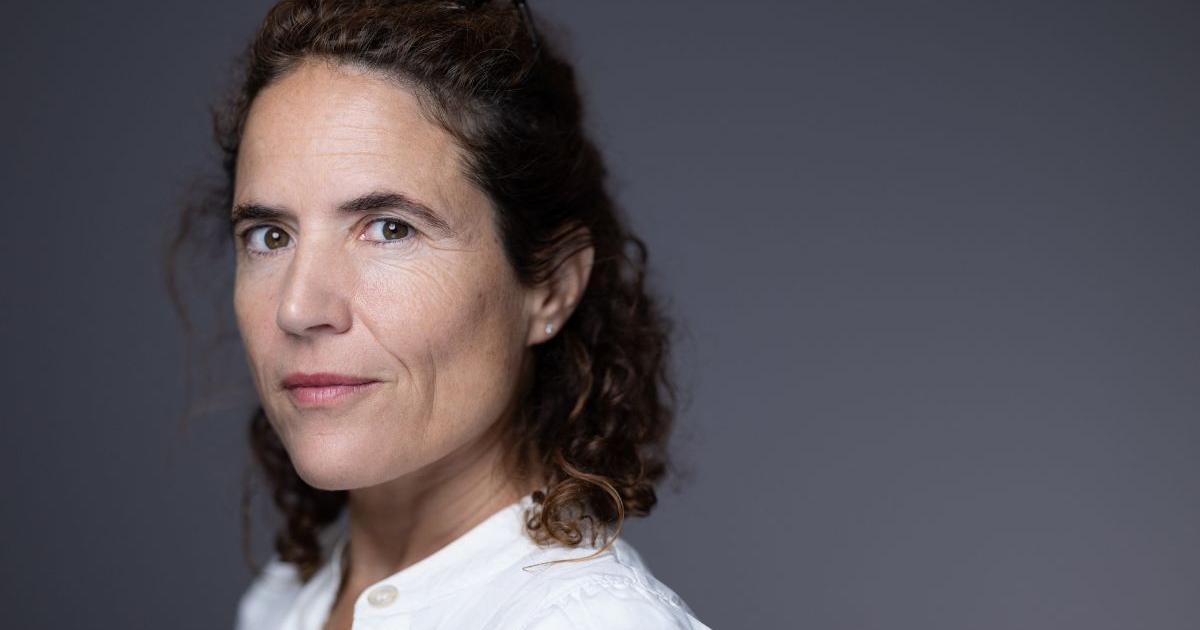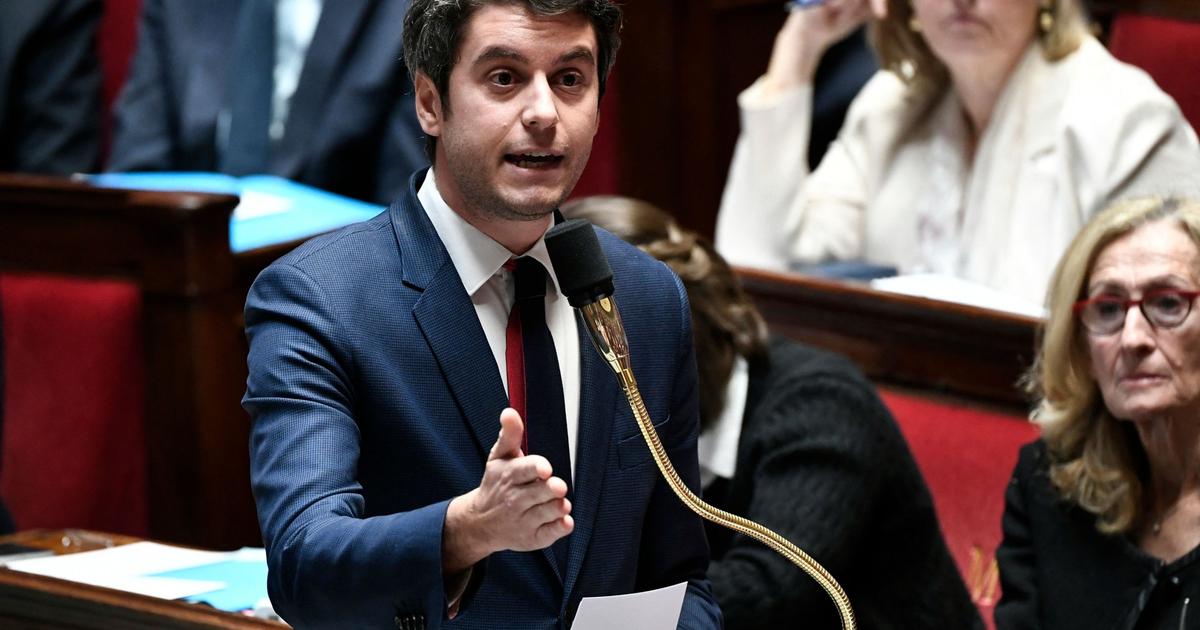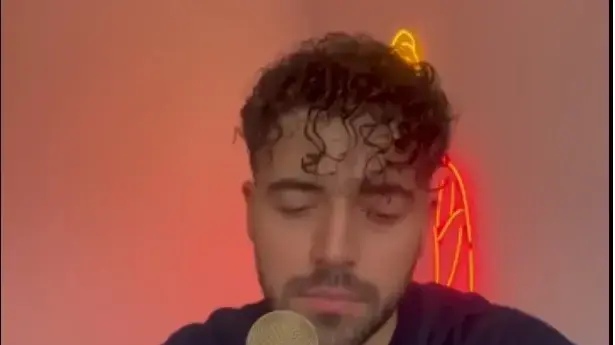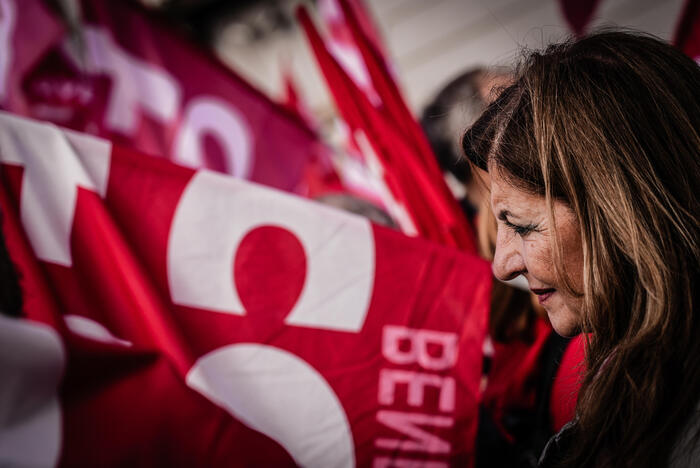They were arrested at night.
Or on their way to work.
Or they simply disappeared.
Since the beginning of the protests against the Islamic Republic four months ago, more than 19,000 people have been arrested in Iran, according to the Human Rights Activists News Agency (HRANA).
Sometimes, several days pass before families learn what happened with their loved ones.
But often, they hear nothing at all.
There are reports of torture and of long prison sentences following show trials in Iran's Islamic Revolutionary Courts.
The proceedings move quickly;
the charges are usually trumped up. Defense attorneys are seldom allowed.
The court consists of a loyalist judge and confessions delivered under torture are taken at face value.
Defendants sometimes turn up to their trials with broken ribs, arms or legs.
One man had to be taken to a hospital instead of jail after the first interrogation.
On November 1, the first death sentence connected to the protests was handed down to Mohsen Shekari.
He was hung five weeks after being convicted.
The family of the 23-year-old reportedly only learned of his death after his execution.
Since then, more and more names are circulating of Iranians who have been accused and convicted of "enmity against God" ("moharebe"), or "corruption on Earth," both of which frequently carry the death penalty.
Usually, the charges are connected to violence against members of the security forces or rioting during the protests.
Often, though, it is enough for a demonstrator simply to have been present or to have expressed solidarity with the protests on the internet.
"Don't Mourn at My Grave"
It is unclear how many people have thus far been sentenced to death or already executed.
There are hardly any foreign journalists in Iran and independent reporting is a rarity.
The majority of sentences that are known have reached the public through activists or family members, and their stories can only laboriously be pieced together with the help of posts on social media.
According to documents acquired by an Iranian hacker group, the Iranian judiciary is currently prosecuting 80 people of "enmity against God."
In early December, Iranian media published a list of 25 names from the judiciary, including teenagers like the 18-year-old Mehdi Mohammadi Fard.
In other cases, such as that of the doctor Hamid Ghare-Hassanlou, the death penalty was later revoked.
Some of the trials have been broadcast on Iranian television.
There is also a recording in circulation of the last words of one prisoner, Majidreza Rahnavardam, who was executed on November 29. Standing next to him in the video are two masked security troops.
Rahnavardam isn't crying, nor does he even seem particularly intimidated.
"Don't mourn at my grave," he says.
"Play happy music."
In this piece, we are introducing a handful of people who are facing possible execution, have already been sentenced to death or were recently executed.
Their stories stood for the many other, unknown victims of the regime.
Mohammad Ghobadlou
A white poster is blowing in the wind beneath a highway bridge in Tehran on December 31. On it is a birthday cake, but the person to whom the poster is dedicated won't be passing by on this day.
Indeed, he likely doesn't even know that the poster exists.
Above the cake, in Farsi, it reads: "Not guilty."
It's Mohammad Ghobadlou's birthday, but it could be very well his last.
Videos on the internet show a smiling young man with styled hair sitting in the driver's seat of a car telling jokes.
He is well-dressed and his large brown eyes are radiant.
But the most recent photos of Ghobadlou show him in the courtroom.
He is wearing blue-striped prisoner's clothing, his hair is trimmed short, and exhaustion is written across his face.
One of the Islamist regime's most severe judges sentenced the man, in his early twenties, in late October for "corruption on Earth."
He allegedly drove into a group of police during a demonstration, killing one of them.
At the beginning of the trial, Ghobadlou's lawyer was allegedly barred from entering the building, which is why he turned to Twitter to make his case.
He rejects the court's allegations.
In a video circulating on Twitter, the young man's mother speaks of her helplessness: "What court sentences its defendants after just a single hearing?"
But that is exactly what appears to have happened with her son.
Scenes from the trial were made public by the regime, apparently in a bid to discourage others from continuing to take to the streets.
Ghobadlou's mother says that her son suffers from psychological problems and that Iranian officials have refused to give him his medication.
On December 24, his appeal was rejected by Iran's highest court.
His execution could take place at any time.
Fahimeh Karimi, volleyball coach
Over and over again, she would pound on the door of her cell and scream "Freedom! Freedom!" along with the names of her children.
Did they hear her?
Or is love unable to escape the iron bars of a prison cell?
Such questions plagued Italian blogger Alessia Piperno , who says that she was locked up in the same prison as Fahimeh Karimi last fall.
For 34 days, Piperno says, the two of them were in the same cell.
Communication was almost impossible, because Karimi is unable to speak English and Piperno knows no Farsi.
"But we shared the same pain and the same fears," says the Italian.
Sometimes, Piperno says, she would sing "Bella Ciao" for Karimi, the Italian partisan song that protesters in Iran also frequently sing in Farsi.
Afterward, Karimi would throw herself back onto the floor, her fingers at her temples as though she wanted to tear her thoughts out of her mind. Karimi, says Piperno, was as white as the walls that enclosed her, swallowing up all the screams.
One day, she says, Karimi was taken to the hospital ward and never returned.
Fahimeh Karimi, the mother of three young children and a volleyball coach, is apparently also facing execution.
She stands accused of having been a leader of demonstrations in Pakdasht, a provincial capital southeast of Tehran, and of attacking a member of the paramilitary organization Basij.
She was apparently sentenced to death for "corruption on Earth" without a proper trial in accordance with Islamic law.
Politicians from Germany, France, Switzerland and Australia have demanded that the young mother be released.
It seems that she has since been transferred from the notorious Evin Prison in Tehran to another jail.
Images apparently showing Karimi and her children have been widely shared on social media.
One of them shows a woman in a black-and-white top wearing a black headscarf, her eyes lined with dark eyeliner and red lipstick on her lips.
Her head is tipped to the side and her eyes are half closed, almost as though she is dreaming.
Another photo shows three young children in colorful shirts on a couch, one of the girls smiling mischievously into the camera.
Piperno says their names are Fatimah, Athena and Mohammed.
They appear to be between two and five years of age.
Piperno writes that ever since being released from prison, she has been searching for the name Fahimeh Karimi, hoping to learn that her former cellmate has also been released.
Instead, she stumbled across Karimi's face in a newspaper.
Above it were the words: "Sentenced to death."
Amir Nasr-Azadani, Football Player
For a professional football player, the 26-year-old Amir Nasr-Azadani does surprising little boasting on his Instagram account.
Instead of photos of luxury cars or hotel pools, he posts images of himself in sports clothes from training, either in the weight room or with a ball.
A rare photo from his private life shows him smiling shyly amid heart-shaped balloons and rose petals.
In front of him is an FC Barcelona birthday cake.
Amir Nasr-Azadani has close to 50,000 followers, but posturing doesn't appear to be his thing.
"Those who know Amir closely know what a reserved boy he was," a former teammate of his is quoted as saying by IranWire, the London-based news outlet.
Another told Sky News that he was a "shy person" and "really kind," adding that he is the kind of person "who cares about others."
His friends find it hard to believe that the player from Isfahan really did the things of which he is accused.
Nasr-Azadani is likely facing the death penalty for "enmity against God."
He is accused of having been part of an armed group that was intending to fight against the Islamic Republic.
Those close to Nasr-Azadani say that his participation was actually limited to merely chanting slogans.
Nasr-Azadani played for teams like Sepahan Isfahan, Tractor and Rah Ahan, and was an up-and-coming national team player a couple of years ago.
Numerous football players have thrown their support behind the 26-year-old, including current national-team players like Sardar Azmoun, who plays for the German team Bayer Leverkusen, and former players like Ali Karimi and Ali Daei, both of whom spent time with Bayern Munich.
Many of the players shared a photo of Nasr-Azadani along with the hashtag #NoDeathPenalty.
Athletes are highly respected in Iran, and they tend to have lots of followers on social media channels, most of them young.
Thus far, that popularity has offered them a degree of protection, but some athletes who have sided with the protesters have recently been taken in for questioning and arrested, their property confiscated and their passports revoked – including the former national team player Voria Ghafouri, a Kurd, and Ashkan Dejagah, who once played for the German team VfL Wolfsburg.
The case of Nasr-Azadani has also evoked bitter memories in Iran: In the autumn of 2020, the wrestler Navid Afkari was publicly executed for the alleged killing of a security guard.
On the day of the World Cup final, the pop star Shakira wrote on Twitter that she hoped the players on the field and elsewhere would remember that a fellow football professional was on death row solely for standing up for women's rights.
Niloofar Hamedi, journalist
Rather it is a picture she shared on Twitter on September 16 of a man and a woman embracing in a hospital hallway.
They are parents of Jina Mahsa Amini, and their daughter lay in a coma in that hospital after collapsing while in police custody.
Hamedi was one of the first to document the fate of the young Kurdish woman.
Jina Mahsa Amini died that same day in Kasra Hospital, which triggered the current wave of protests in Iran.
Just a few days later, officers arrested 30-year-old Hamedi.
Security officials are said to have searched her home and confiscated both her mobile phone and laptop.
Among the charges leveled against her is espionage, which can be punished by execution.
She is alleged to have been trained by foreign intelligence agencies.
She has, according to reports, been locked away in solitary confinement since then.
Hamedi was almost certainly fully aware of the risk she was taking.
According to Reporters Without Borders, there are currently 46 journalists in prison in Iran.
On the organization's World Press Freedom Index, Iran is in position 178 out of 180. Even prior to Amini's death, Hamedi had written about the brutality of Iran's morality police.
"She always went beyond her limit to be the voice of voiceless women who were deprived of their rights, whether by their fathers, husbands, or by social limitations," a friend of hers told Reuters in October.
Pictures taken before her imprisonment show her working as a reporter in a football stadium or lying in the sun in a meadow.
Her husband wrote on Twitter that she loves yoga, adding that supporters should write her a letter, since she also loves receiving mail.
In photos, Hamedi wears a headscarf, often in light colors, but always loose.
Sometimes, she doesn't wear one at all. One photo shows her smiling in a field of flowers, her arms spread wide.
On the hundredth day of her imprisonment, her husband shared a map on Twitter of his marathon training map around the prison.
He wrote that as he runs around the prison on the outside, she is running inside.
"We are on two different sides of the wall, but we aren't giving up on life," he wrote.
"The strength of our love is stronger than the power of darkness."
Hossein Mohammadi, Stage Actor
There are several video clips of Hossein Mohammadi circulating on the internet.
Hardly any of them are longer than one minute, but they are so intimate that you immediately get the feeling that you almost know the delicate 25-year-old from the city of Karaj.
"Today is the best day of my life, because it's your birthday mommy," Mohammadi says in touching exuberance in a seven-year-old video directed at his ill mother.
The son holds tickets he has purchased for the two of them in front of his mobile phone camera.
"I love you so much," he says several times while kissing his hand.
In another film, Mohammadi is celebrating his own birthday.
It appears that friends have given him a cake.
Mohammadi thanks them with a wide smile, touching his fingertips together.
It is clearly easy for him to express his feelings and to carry others along with him with his gestures and facial expressions.
Mohammadi is a stage actor.
Some pictures and videos show him onstage, looking serious with long hair and a beard.
A friend of his says that he has also performed puppet shows for children suffering from cancer.
It looks as though Mohammadi has also previously played the role which the Iranian regime is now forcing upon him in real life: an innocent man accused of murder.
There is a video clip of that performance as well.
Mohammadi was arrested in Karaj in early November and later sentenced to death.
He and four other men are allegedly responsible for the death of a Basij militia member who, according to the regime, lost his life at a mourning ceremony held on the 40th day after the death of Hadis Najafi.
The 22-year-old Najafi had become an icon of the protest movement after she was presumably killed by several shots from security forces.
Mohammadi was arrested two days later, on November 5. Mohammadi was not allowed to have a lawyer of his choice at the accelerated proceedings.
In contrast to his co-defendants, no video of him delivering an apparently coerced confession was disseminated.
Now, Iranian state media has reported that the country's highest court has revoked his death sentence.
Thus far, though, there has been no official confirmation of that report, nor is it clear what alternative sentence may be awaiting him.
Indeed, the way Mohammadi's case has been handled is a perfect example of the judiciary's caprice and for the ongoing effort to intimate protesters.
Toomaj Salehi, rapper
His lyrics are angry, the rhythm captivating and the rhymes are convincing: "This is the battlefield, our sword is the love."
With such lines, the Iranian rapper Toomaj Salehi has contributed to the soundtrack of the uprising in his country.
Repeatedly in his songs, he has called on people to stand up to the regime.
He initially made a name for himself in the summer of 2021 at the peak of the protests in Khuzestan province that erupted due to water shortages.
A song of his began circulating in Iran in which he settles accounts with all those he sees as supporters or apologists of the regime.
Born in the early 1990s, Salehi is from southwestern Iran and belongs to the Bakhtiari tribe.
According to reports citing family members, his deceased mother was once a political prisoner.
Political activists from his mother's generation have long since abandoned hopes that the regime might reform itself.
Salehi is now a voice of those who have been intermittently taking to the streets in many parts of the country since 2017, sometimes in smaller groups, sometimes in larger ones.
They are driven by poor living conditions and their fury at the country's elite.
"You are dealing with a mafia that is ready to kill the entire nation ... in order to keep its power, money and weapons," he told the Canadian broadcaster CBC in a video interview shortly before his arrest in late October.
That is why it is impossible to negotiate with the regime, he said.
He expressed his conviction that the peaceful protests would continue and expand.
Now, Salehi is in prison and has no direct contact with his family.
He has been prosecuted for "corruption on Earth."
His relative fear that he has been tortured in prison.
In early December, a state media outlet published a video of Salehi in which he reads out a confession that to all appearances was coerced.
"I'm a soothsayer, a truth sayer," he raps in his final video.
The song is called "Faal," or Omen.
"I saw a cage in the coffee cup of the government."
The song was listened to more than 140,000 times on Spotify and the YouTube video has been watched over 340,000 times.
"If the regime wanted the people of Iran to doubt Toomaj Salehi and his integrity, they have achieved precisely the opposite," German member of parliament Ye-One Rhie of the center-left Social Democrats told DER SPIEGEL.
"I get so many messages from Iran in which people tell me how much trust they have in Toomaj Salehi. Many of them write: 'He is the best of us.'"
The German politician is doing what she can to call attention to his plight on social media and has also sent letters to Iranian officials, including the Iranian ambassador in Berlin.
She is one of a number of German lawmakers who are trying to exert pressure on Iran.
The Iranian ambassador, Rhie says, only responded to the first of seven letters.
"He wrote me that he would forward my letter to the appropriate officials and then he contradicted my version of events. In contrast to my assumptions, all trials in Iran are conducted in accordance with the rule of law, he wrote, and consistent with the Muslim principle of compassion. As such, I needn't worry."
Rhie is demanding in-person access to Salehi to get a first-hand impression of his state of health.
Rappers long remained largely underground in Iran and many left the country many years ago.
But Salehi didn't publish his anti-regime lyrics from exile.
True to rap tradition, he presents himself as the furious voice of victims of state repression and is consistently provocative.
In autumn 2021, he was arrested a first time and charged with "anti-system propaganda."
He was then released after his incarceration drew significant attention.
Editors note: After this article originally appeared in German on Friday, we learned on Saturday morning that two additional demonstrators had been executed.
Here are their stories:
Seyyed Mohammad Hosseini, Martial Arts Teacher
Very little is known about Seyyed Mohammad Hosseini.
He apparently had no family who tried to defend him.
According to posts on social media, his parents are deceased.
A friend of his told the
Guardian
that he would visit their graves every Thursday evening.
"Seyyed has no one in this world," the friend said, adding that he was a quiet, good-natured sort who suffered from mental health problems and anxiety following the death of his parents.
According to the friend, Hosseini was 39 years old and offered free martial arts training to disadvantaged children.
He apparently earned only a tiny salary as the employee of a poultry farm.
He is thought to have been locked up in Karaj, having been accused of participating in the murder of a Basij militia member.
According to IranWire, his lawyer says that Hosseini was badly abused in prison.
"His narration of his torture was full of tears: beating with eyes blindfolded, hands and feet tied, kicking to the heat until he fainted."
Hosseini was also allegedly beat on the soles of his feet with an iron rod and administered electric shocks to various parts of his body.
He was hung on January 7.
Mohammad Mahdi Karami, Karate Fighter
"Don't tell mom."
That is apparently what Mohammad Mahdi Karami told his father in a tear-choked voice over the phone when he informed him of his sentence.
That, at least, is what Mashallah Karami told the newspaper
Etemad
in December.
Since then, the father said, Mohammad's mother has been crying day and night over the son she loves so much.
Karami was 22 and one of two children of the family from a small village in the Kurdistan region.
His final place of residence was in Karaj, west of Tehran.
He was accused of having killed a member of the Basij militia at an early November mourning ceremony.
His father says that isn't something his son would ever do.
"My son is an athlete and always tried to win with honor."
His father, a simple street vendor, says he invested great effort in raising his son.
Karami was a karate champion.
Images on Twitter show a collection of certificates and numerous medals lined up on a string on the wall.
They are from both national and international competitions.
The activist group 1005tasvir says that security forces beat Karami so bad during his arrest that they initially left him unconscious on the ground, believing him to be dead.
Once in jail, Karami was apparently tortured and allegedly threatened with rape.
He reportedly received no medical attention for his injuries.
He was hung on January 7.















